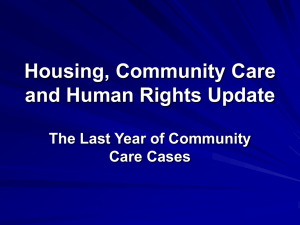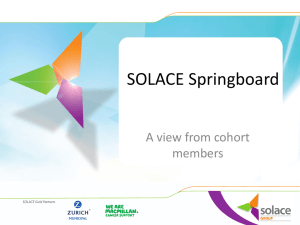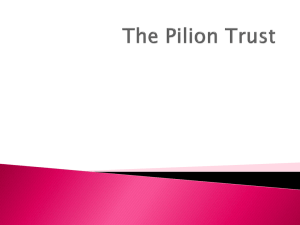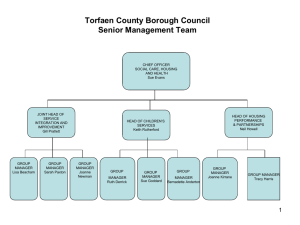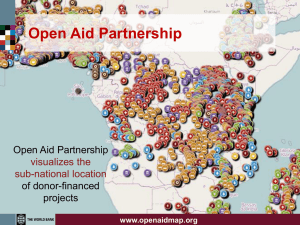Presentation Report - London Sustainability Exchange
advertisement
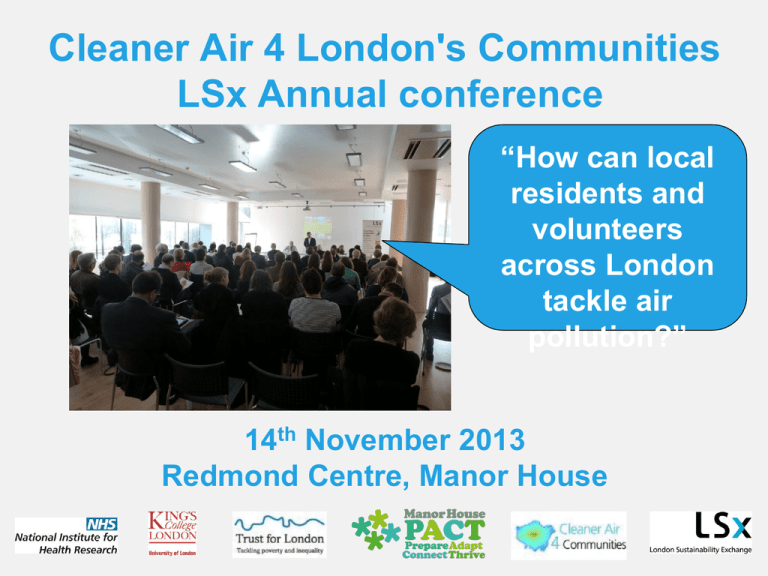
Cleaner Air 4 London's Communities LSx Annual conference “How can local residents and volunteers across London tackle air pollution?” 14th November 2013 Redmond Centre, Manor House Aims of event The aim of LSx’s Annual Conference was to: • Bring together stakeholders across London to increase understanding of and engagement with air quality issues amongst communities • Facilitate shared learning, expertise and create new partnerships • Showcase success stories of community work around air quality, regeneration and environmental inequality • • Share barriers, opportunities and top tips to influence policy and planning Identify critical next steps between business, the public sector and voluntary groups to accelerate change. Event Agenda Registration and Lunch Introduction and objectives Workshops 1 Why are we here? Air Quality and Transport in London Solutions from freight transport Samantha Heath Murad Qureshi Chris Snelling Citizen Science; power of citizen led research Achieving behaviour change through schools Influencing Air Quality through planning Influencing Air Quality through health & wellbeing Sasha Pratt Ben Hudson Samantha Heath Jane Mulholland Break and Technology Showcase Workshops 2 Summary Citizen Science; power of citizen led research Achieving behaviour change through schools Influencing Air Quality through planning Influencing Air Quality through health & wellbeing Sasha Pratt Ben Hudson Samantha Heath Jane Mulholland Reducing our exposure to Air pollution Feedback and next steps Ben Barrett Samantha Heath Close Keynote speakers Murad Qureshi – Chair of London Assembly Environment Committee • We need to measure and record our air quality • The Ultra Low Emission Zone needs to be brought forward • Transport infrastructure needs investment Christopher Snelling Head of Urban Logistics – Freight Transport Association • Investment is occurring public and private sector in technology and infrastructure • Policy needs to apply to public and private sector alike • Congested traffic cost business money – this needs to be addressed Workshop 1 Influencing Air Quality through planning Aims of workshop • To review how air quality can be influenced by the planning process • To highlight that air quality is not currently considered sufficiently • To Initiate a flow of ideas around how to increase the importance of air quality in planning Workshop 1 Influencing Air Quality through planning Outcomes of workshop • Developers were inspired to Include air quality neutral and public liaison from an early planning stage, this new planning requirement has yet to be tested. • Some local authorities have a range of requirements ( that could be shared) from developers – reduction of pollution in the construction stage and specific 106 requirements. • The community interest levees (CIL) has yet to be deployed for air quality – this is an opportunity. Workshop 2 Influencing air quality through Health & Well-Being Boards Aims of workshop • To support London’s communities better understand the health impacts of air pollution and what actions can be taken to mitigate these effects. • Look at how the health agenda can be influenced to incorporate air quality concerns and begin to tackle poor air quality Workshop 2 Influencing air quality through Health & Well-Being Boards Outcomes of workshop • There is a clear disconnect between the environmental and public health communities. • High-level understanding linking air quality and public health, coupled with local authorities having environmental health remit presents us with a unique opportunity for increasing pressure on authorities at different levels for holistic planning • Presenting well-documented, quantifiable evidence highlighting the costs of poor air quality for local councils is essential. Workshop 3 Achieving behaviour change through schools Aims of workshop • To communicate LSx’s Cleaner Air 4 School (CA4S) work with primary schools and explore educational and community benefits of taking work out of the classroom with citizen science. • Attendees invited to comment on, feedback and discuss implications of the project. • How can we achieve behaviour change beyond the classroom and engage the wider public? Workshop 3 Achieving behaviour change through schools Outcomes of workshop • Community leaders were inspired to participate in citizen science ideas including lichen observation. • Discussions took place about new approaches to reduce children’s exposure to air pollution during their journey to school. • Power of young people – groups suggested there is a role for young people to play as advocates to engage politicians and the wider public directly. • Create stronger links to health and wellbeing and demonstrate effects in Workshop 4 Citizen science: The power of citizen-led research Aims of Workshop • To explore how citizen science techniques can help communities provide evidence to influence behaviour. • Why do we want to change our exposure to poor air quality? • What citizen science methods can be used to gather evidence? • Whose behaviour do we want to influence? • How can citizen science inspire behaviour change in a community? Workshop 4 Citizen science: The power of citizen-led research Outcomes of workshop • Community groups were inspired to learn more about air quality • A number of community members are looking into the possibility of carrying out a air quality research project within their communities. Technology Showcase Aims of the Showcase • The Technology Showcase brought a number of innovative products to monitor, reduce impact on, or exposure to air quality. • The showcase aimed to offer personal solutions to air quality challenges faced by Londoners and create connections between innovative embryonic products and the end users that need them Testing the air quality route planner Experiment to demonstrate how personal exposure to air quality can be reduced through route planning On the day of the conference Dr Ben Barrett and Andrew Grieve of King’s College London demonstrated the impact of taking a different route to reduce personal exposure to air pollution by wearing air monitors on two routes; travelling by tube and along Seven Sisters road, and travelling by rail and walking through Finsbury park. It is clear that Ben was exposed to far greater concentrations of Black carbon than Andrew, highlighting the importance of route selection in minimising exposure. The full presentation can be found on the LSx website. Next Steps LSx asked conference attendees what actions they would like to take following the conference.... • 44% pledged to work with schools, businesses, and communities • 29% pledged to support ultra/low emissions zones • 31% pledged to campaign for retrofitting or upgrading buses and taxis • 38% pledged to change their own behaviours to help improve air quality in their homes and local areas Next Steps; policy actions The causes of poor air quality are complex, therefore responses to the challenge are not simple, however as a result of this conference we know that we need to: • Ensure that policies across London apply equally to the public and private sector • Seek to support well-documented, quantifiable evidence highlighting the costs of poor air quality for local councils - to present to H&W Boards*. • Planning instruments such as Air Quality Neutral and CILs** are useful tools to invest in air quality reduction, but considerable work in developing tools for planners and community alike. • Technology has a role to play to meet the challenge – TSB***, and the LEP**** could support development in this area. *H&W Boards – Health & Well-Being Boards ** CIL – Community Infrastructure Levy https://www.gov.uk/government/uploads/system/uploads/attachment_data/file/6313/1897278.pdf *** TSB – Technology Strategy Board **** LEP - Local Enterprise Partnerships Feedback from the event Feedback from the event was positive and constructive: • 73% rated the event as excellent or very good • 54% rated their level of new learning as excellent or very good • 80% rated their opportunity to network through the event as excellent or very good Feedback from the event • “[It was helpful] meeting people and learning about policies and case studies where air quality policies work.” • “[It was helpful] meeting others, and there was a wide educational benefit for many who attended. Putting air quality higher up the agenda is very important.” • “I enjoyed the factual presentations that provided new information and insight into the scope and nature of the [air quality] issue, e.g. the transport logistics speaker.” • “[It was helpful learning] that there are many people across a range of disciplines who are also interested and working in this area.” • “Congratulations. Excellent event in so many ways!” Thank you Delegates to all our attendees! Age UK AirQualityNews.com Around the Block Ayurved Consultancy Battersea Society Changing Minds Citizen Sense Clean Air in London Close the Door Cross River Partnership Department for Transport Emergent Research Goldsmiths College Greater London Authority Groundwork London Haringey Agenda 21/ other organisations Harrow Environmental Forum Hayes Community Development Forum Heathrow Airport Ltd Hollyfield School Imperial College In Mid Town Investec Bank Ltd Invisible Dust Energy Saving Trust Environmental Management Publishing Limited Esmee Fairbairn Foundation LEAP micro AD, WRAP project Lend Lease Future Energy Strategies Lightsource Renewable Energy Limited Living Streets Global Action Plan UK Lifeworld London Borough of Brent London Borough of Camden London Borough of Croydon London Borough of Greenwich London Borough of Hackney London Borough of Havering London Borough of Hillingdon London Borough of Hounslow London Borough of Islington London Borough of Merton London Borough of Newham London Borough of Richmond upon Thames London Borough of Southwark London Voluntary Service Council LVSC Manor House Development Trust No to Silvertown Tunnel Positive Choice Putney Society RAC Foundation for Motoring Soho Housing Association South West London Environment Network Sustainable Merton Sustrans London The Environment Agency Transport for London Trees For Cities UK LPGas University College London Victoria Business Improvement District BID Whittington Agenda 21 Group


